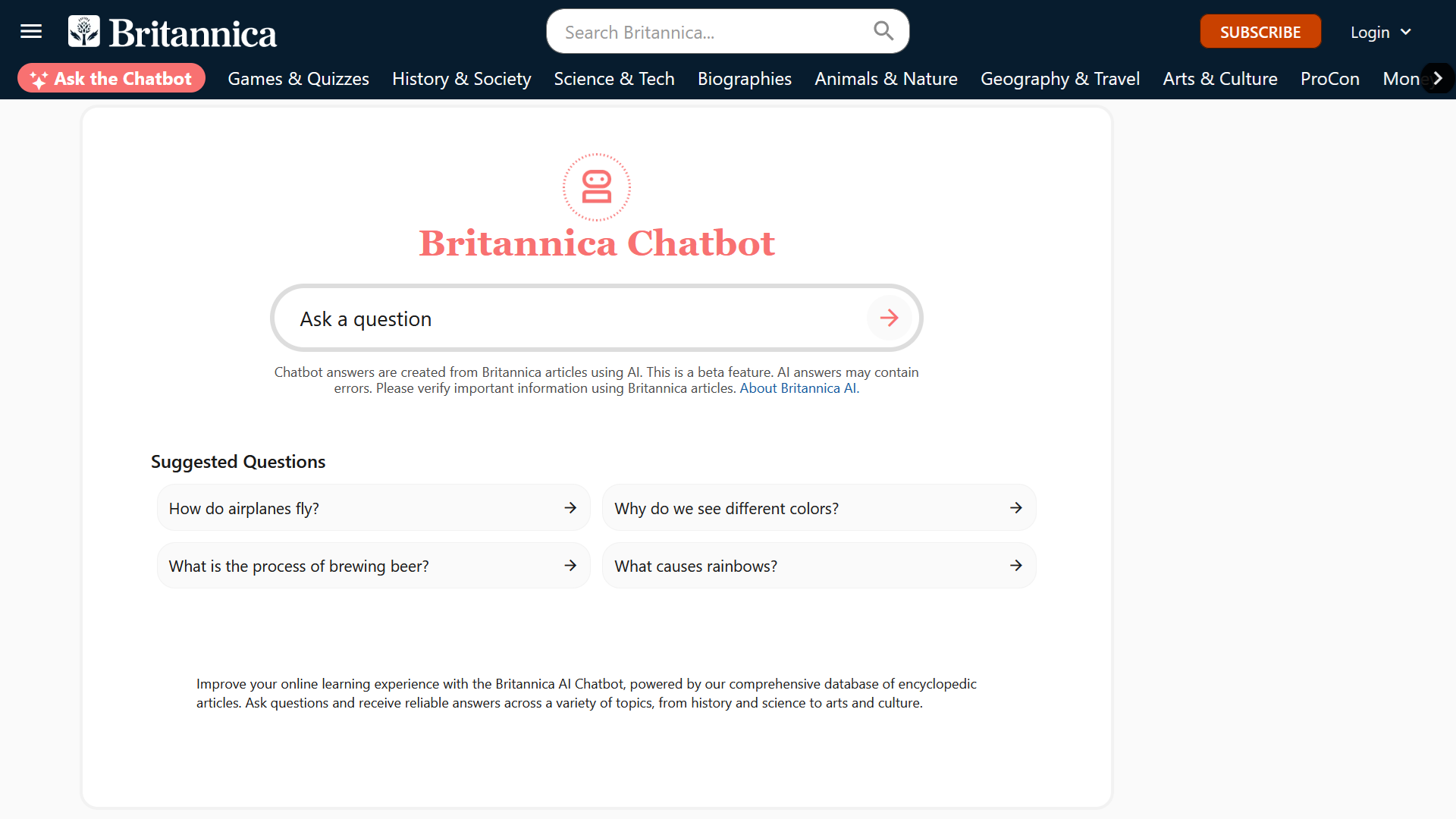I compared ChatGPT to the Britannica AI chatbot, and the results make me want to buy the entire encyclopedia
The AI reference librarian of my dreams

Sign up for breaking news, reviews, opinion, top tech deals, and more.
You are now subscribed
Your newsletter sign-up was successful
Ordering a full Encyclopedia Britannica set in 2025 sounds like something only a committed Luddite, or someone who refuses to listen to music on anything but vinyl, would do. After experimenting with the Britannica AI chatbot, though, I'm tempted to join that list. I'm not sure if my overstuffed bookshelves have room for the 32 massive volumes, but the AI serves as a very helpful reference librarian, delving into the depths of over 250 years of fact-checked information to answer my questions.
The restricted sourcing means you don't have to worry nearly as much about Britannica AI responding with hallucinations or outright fantasies. The cross-referenced answers don't have the breadth of information available to general-purpose AI chatbots like ChatGPT, but that's not always a negative.
Notably, if you ask Britannica AI a question it doesn't feel it can properly answer, it will use ChatGPT to respond and include an extra warning about how the AI could get things wrong. Still, I decided to see how ChatGPT would perform when asked the kind of questions you'd submit to an encyclopedia's AI.
1. French History

History questions are one of the most common uses for encyclopedias. A central goal of early encyclopedists was to condense massive amounts of geopolitics into articles for easy reference. I asked both AI chatbots to “Explain the causes and consequences of the French Revolution.”
Britannica AI responded with dense bullet point lists of the reasons for the revolution and the results that followed, linking things like social inequality under the Ancien Régime and the Enlightenment all the way through to the Napoleonic Wars. It then offered several related follow-up questions I might be interested in, along with links to 13 cited Britannica articles. Each article goes into great depth, but for the kind of quick answers I'd want for something so complex, it was a perfect response.
ChatGPT went for more of a narrative approach and definitely had a more conversational, casual tone. Its response didn't have any obvious flaws, but as throughout the testing, it also lacked something of the gravitas of Britannica's chatbot.
2. Macbeth

Literature is a trickier domain for encyclopedias, requiring authoritative opinions to explain and analyze. The best articles are full of both facts and well-reasoned interpretations of what the author wrote. If there's one writer Britannica has written about endlessly since its inception, it's Shakespeare. That's why my next prompt asked both AI chatbots to “Summarize the plot and themes of Shakespeare’s Macbeth.”
Sign up for breaking news, reviews, opinion, top tech deals, and more.
Britannica AI came back with a nice condensed summary of the play, followed by a list of five major themes and a short explanation of how each applies to Macbeth. ChatGPT's summary was again more casually phrased, but, interestingly, it seems like ChatGPT was either using Britannica as a source or pulling from a secondary source using Britannica because the list of themes and how they relate to the play was almost verbatim.
For instance, Britannica wrote for one of the themes, "The Supernatural: The Weird Sisters represent the supernatural, catalyzing Macbeth's corruption and blurring the line between reality and illusion. Their prophecies influence Macbeth's actions, but are ultimately deceptive."
Meanwhile, ChatGPT's response basically rephrases and condenses the same point by writing, "The Supernatural: Witches, visions, and omens create a foreboding atmosphere and symbolize the moral disorder brought about by Macbeth’s actions."
3. Mitosis

I moved from Shakespeare to cells with the next query, one about biology. I asked both AI chatbots, “What are the main differences between mitosis and meiosis?”
Britannica AI was in its element. It gave a side-by-side comparison of the processes, clearly outlining the number of cell divisions, the genetic outcomes, and the biological roles of each. ChatGPT decided it had nothing to prove and gave the shortest answer yet. To compare, Britannica answered with another bulleted list of differences after writing that, "Mitosis and meiosis are both forms of cell division in eukaryotic cells, but they have distinct outcomes. Mitosis produces two genetically identical daughter cells from a single parent cell and is used for growth, repair, and asexual reproduction. Meiosis, on the other hand, is a specialized type of cell division that occurs in sexually reproducing organisms. It gives rise to four genetically distinct gametes (sex cells) with half the number of chromosomes as the original cell.
ChatGPT's answer was correct, but somewhat less detailed, some might say less encyclopedic, "Mitosis produces two genetically identical daughter cells with the same number of chromosomes as the parent cell, used for growth, repair, and asexual reproduction. Meiosis, on the other hand, results in four genetically unique daughter cells with half the number of chromosomes, essential for sexual reproduction."
Encyclopedic AI
Britannica AI is as impressive and reliable as the encyclopedia. I appreciated the capsule summaries it provided as skimming for those bits is how I would use an encyclopedia when I don't have a lot of time, and those amazing and dense articles it linked to were what I would read for fun as a kid when time permitted.
Where ChatGPT did its best work was when it paralleled Britannica's answers. The far more casual language used to respond is totally fine in most cases, but it lacks the academic appeal of how Britannica answered. Plus, with ChatGPT, there is the constant wariness over potential hallucinations and the need to double-check any fact that seems off., or even just oversimplified.
When I need a trustworthy factual answer or if I want rock-solid citations, Britannica AI may be my new go-to AI chatbot. For anything beyond what an encyclopedia can offer, I will turn to ChatGPT as my AI assistant. Still, I know which I'd rather have as a set of handsome leatherbound tomes on my next bookshelf.
You might also like

Eric Hal Schwartz is a freelance writer for TechRadar with more than 15 years of experience covering the intersection of the world and technology. For the last five years, he served as head writer for Voicebot.ai and was on the leading edge of reporting on generative AI and large language models. He's since become an expert on the products of generative AI models, such as OpenAI’s ChatGPT, Anthropic’s Claude, Google Gemini, and every other synthetic media tool. His experience runs the gamut of media, including print, digital, broadcast, and live events. Now, he's continuing to tell the stories people want and need to hear about the rapidly evolving AI space and its impact on their lives. Eric is based in New York City.
You must confirm your public display name before commenting
Please logout and then login again, you will then be prompted to enter your display name.